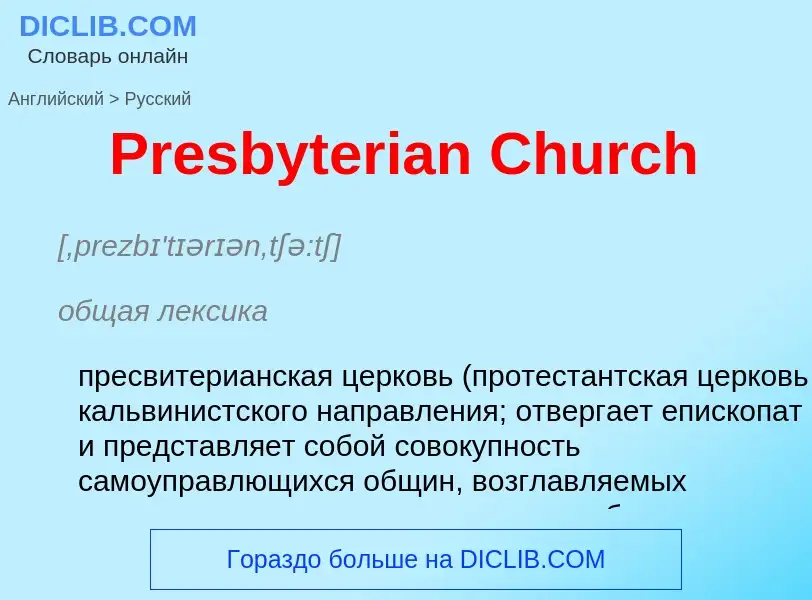Vertaling en analyse van woorden door kunstmatige intelligentie ChatGPT
Op deze pagina kunt u een gedetailleerde analyse krijgen van een woord of zin, geproduceerd met behulp van de beste kunstmatige intelligentietechnologie tot nu toe:
- hoe het woord wordt gebruikt
- gebruiksfrequentie
- het wordt vaker gebruikt in mondelinge of schriftelijke toespraken
- opties voor woordvertaling
- Gebruiksvoorbeelden (meerdere zinnen met vertaling)
- etymologie
Presbyterian Church - vertaling naar Engels
[,prezbɪ'tɪərɪən,tʃə:tʃ]
общая лексика
пресвитерианская церковь (протестантская церковь кальвинистского направления; отвергает епископат и представляет собой совокупность самоуправлющихся общин, возглавляемых пресвитерами; практически лишена обрядности; в храмах нет икон, богослужение сводится к проповеди и пению псалмов. Основана в 16 в.; с конца 16 в. - государственная церковь Шотландии)
синоним
[prezbi'ti(ə)riən]
прилагательное
религия
пресвитерианский
относящийся к пресвитерианству
существительное
[prezbi'ti(ə)riən]
общая лексика
пресвитерианин
пресвитерианка
Definitie
Wikipedia

Presbyterianism is a part of the Reformed tradition within Protestantism that broke from the Roman Catholic Church. Presbyterian churches derive their name from the presbyterian form of church government by representative assemblies of elders. Many Reformed churches are organised this way, but the word Presbyterian, when capitalized, is often applied to churches that trace their roots to the Church of Scotland or to English Dissenter groups that formed during the English Civil War.
Presbyterian theology typically emphasizes the sovereignty of God, the authority of the Scriptures, and the necessity of grace through faith in Christ. Presbyterian church government was ensured in Scotland by the Acts of Union in 1707, which created the Kingdom of Great Britain. In fact, most Presbyterians found in England can trace a Scottish connection, and the Presbyterian denomination was also taken to North America, mostly by Scots and Scotch-Irish immigrants. The Presbyterian denominations in Scotland hold to the Reformed theology of John Calvin and his immediate successors, although there is a range of theological views within contemporary Presbyterianism. Local congregations of churches which use Presbyterian polity are governed by sessions made up of representatives of the congregation (elders); a conciliar approach which is found at other levels of decision-making (presbytery, synod, and general assembly). There are roughly 75 million Presbyterians in the world.
The roots of Presbyterianism lie in the Reformation of the 16th century, the example of John Calvin's Republic of Geneva being particularly influential. Most Reformed churches that trace their history back to Scotland are either presbyterian or congregationalist in government. In the twentieth century, some Presbyterians played an important role in the ecumenical movement, including the World Council of Churches. Many Presbyterian denominations have found ways of working together with other Reformed denominations and Christians of other traditions, especially in the World Communion of Reformed Churches. Some Presbyterian churches have entered into unions with other churches, such as Congregationalists, Lutherans, Anglicans, and Methodists. Presbyterians in the United States came largely from Scottish immigrants, Scots-Irish immigrants, and also from New England Yankee communities that had originally been Congregational but changed because of an agreed-upon Plan of Union of 1801 for frontier areas.


![[[Fourth Presbyterian Church (Chicago)]], built 1914 [[Fourth Presbyterian Church (Chicago)]], built 1914](https://commons.wikimedia.org/wiki/Special:FilePath/4th Presbyterian Chicago 2004-11 img 2602.jpg?width=200)



![[[Christ Presbyterian Church, Akropong]], Ghana [[Christ Presbyterian Church, Akropong]], Ghana](https://commons.wikimedia.org/wiki/Special:FilePath/Christ Presbyterian Church Akropong.jpg?width=200)

![[[Iona Abbey]] in Scotland was founded by [[Saint Columba]] [[Iona Abbey]] in Scotland was founded by [[Saint Columba]]](https://commons.wikimedia.org/wiki/Special:FilePath/Iona Abbey, Entrance and St John's Cross. - geograph.org.uk - 113441.jpg?width=200)

![[[Kaikorai Presbyterian Church]], New Zealand [[Kaikorai Presbyterian Church]], New Zealand](https://commons.wikimedia.org/wiki/Special:FilePath/Kaikorai Presbyterian Church Dunedin New Zealand.jpg?width=200)



![Rev [[Bruin Romkes Comingo]], 1st Presbyterian Minister in Canada, [[St. Andrew's Presbyterian Church (Lunenburg)]] Rev [[Bruin Romkes Comingo]], 1st Presbyterian Minister in Canada, [[St. Andrew's Presbyterian Church (Lunenburg)]]](https://commons.wikimedia.org/wiki/Special:FilePath/Rev Bruin Romcas Comisco, Lunenburg, Nova Scotia.png?width=200)


![Westminster Presbyterian Church [[Los Angeles]] Westminster Presbyterian Church [[Los Angeles]]](https://commons.wikimedia.org/wiki/Special:FilePath/Westminster Presbyterian Church Los Angeles.jpg?width=200)
